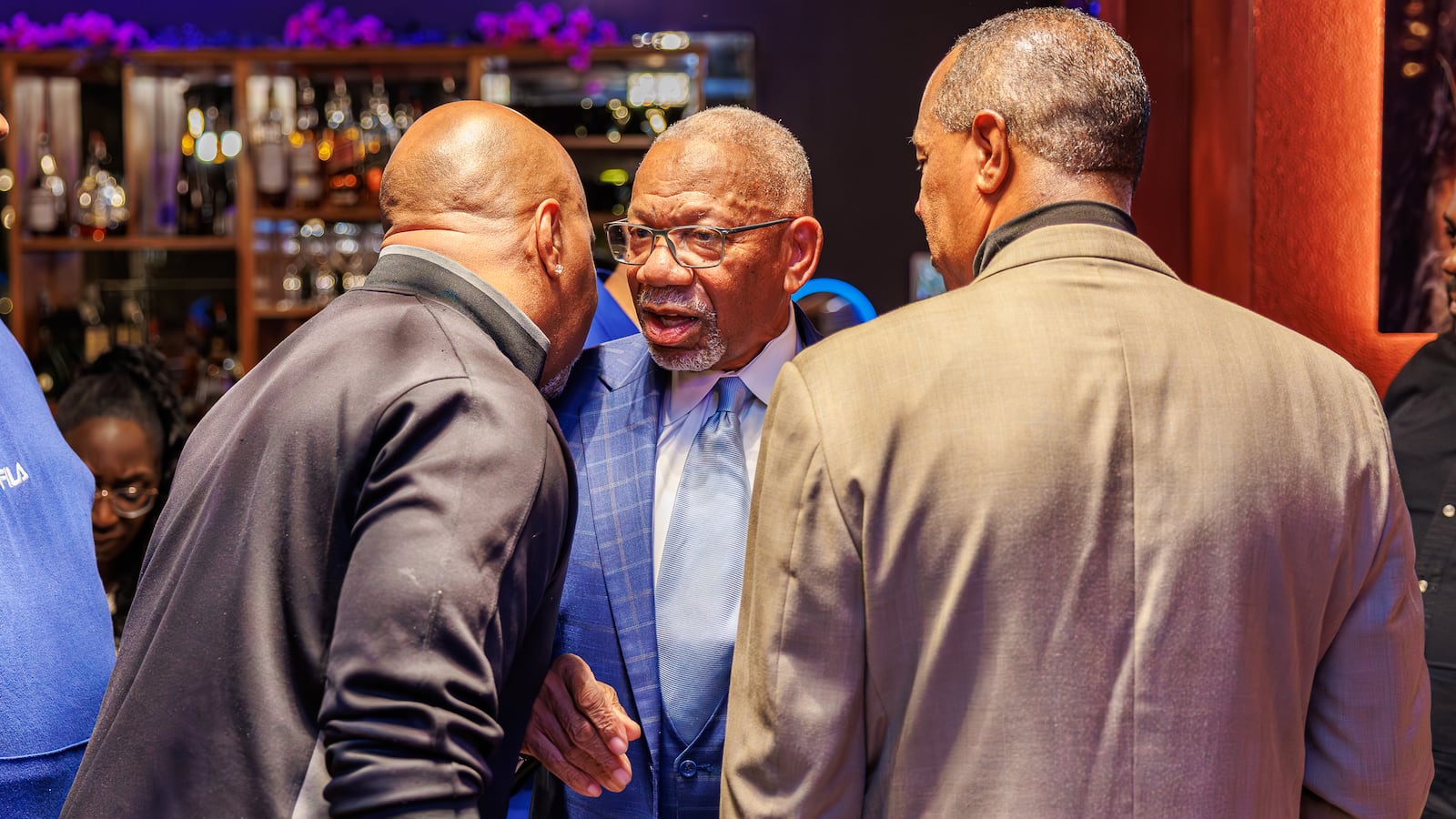This analysis looks at notable local races and issues decided Tuesday.
Dayton mayor
In one of the night’s biggest upsets, Dayton City Commissioner Shenise Turner-Sloss defeated incumbent Mayor Jeffrey Mims Jr.
It was one of the closest races for the mayor’s seat in years. Turner-Sloss won with 52% of the vote, according to unofficial final results from the Montgomery County Board of Elections.
Turner-Sloss ran on a slate with Commissioner Darryl Fairchild and Jacob Davis in a bid to secure a majority on the five-member board. Fairchild won reelection, but Davis lost.
Instead, Mims’ ally, Darius Beckham, was elected. This leaves the power dynamic on the commission about the same with Turner-Sloss and Fairchild in a minority bloc on the five-person board — but with Turner-Sloss now having a much larger bully pulpit in the mayor’s seat.
Turner-Sloss struck a conciliatory tone in the wake of her victory, thanking Mims — who until now had never lost an election in a long political career — for his service to the community.
“I look forward to working with the people of this city to solve problems together — building unity and leaving divisiveness in the past," she said in a statement. “Thank you, Dayton voters. As Mayor-Elect, I look forward to our partnership to take Dayton to the next level— and together, we will soar.”
Mims said in an Election Night statement: “The people of Dayton have spoken, and I respect their choice. It has been one of my greatest honors to serve as your mayor. Though I am disappointed with this outcome, I remain committed to fighting to keep moving Dayton forward.”
Mims raised and spent more than twice what Turner-Sloss did, according to campaign finance reports filed before the election.
Fairchild said voters on Tuesday signaled to city leadership that they want Turner-Sloss to lead the city and believe in her vision.
“It would a huge mistake to disrespect the will of the voters,” Fairchild said.
Credit: Bryant Billing
Credit: Bryant Billing
Dayton hospital levy
Dayton voters also decidedly backed a 1-mill levy to build a new hospital in west Dayton.
The question now is what to do with the money. The levy stemmed from a citizen-led petition that passed despite opposition from city leaders, who criticized the lack of any specific plan on how to spend the funds. The tax will now collect $2 million a year, but that’s not nearly enough to build a hospital to replace Good Samaritan Hospital.
Voters decided it’s worth a try, though, supporting the proposal with 58% of the vote, according to unofficial final results from the Montgomery County Board of Elections.
Nancy Kiehl, community outreach coordinator with the Clergy Community Coalition, which backed the measure, said many Dayton residents supported Issue 9 because the loss of Good Sam hospital hurt them directly.
But other residents supported the measure because they also lost important medical services where they live, she said.
Kiehl said Issue 9’s passage by a wide margin shows people believe the closure of Good Sam was the wrong decision and there is a huge need for a hospital in that area.
“It was 10,000 people 100 years ago who made contributions for the building of Good Samaritan Hospital, and this is a way for Daytonians again to be vested in the building of a hospital and to kind of say this is an important thing for the community,” she said.
Kettering mayor, council
Kettering voters elected Bryan Suddith as their new mayor in a landslide victory over fellow Councilman Bob Scott. Suddith received 64% of the vote, according to unofficial final results from the Montgomery County Board of Elections.
Suddith will lead one of the least experienced city councils in Kettering’s history. Two political newcomers were also elected to the city council, with voters picking Laura Arber and Dan Palmer in a three-way race with Tyler Scott (who is not related to Bob Scott). Suddith has only served as a councilman for two years. Bob Scott, who will stay on the council, has only been there four years.
“The average tenure will be two years experience in January. We’ve not seen that since the early start of the city,” Suddith said.
Suddith noted that he won 40 of Kettering’s 41 precincts.
“I think what it says is Kettering really wanted a leader that was not about a party, that was really about community and neighbors first,” Suddith said.
Both Scott and Suddith are registered Republicans. But Suddith ran with the endorsement of current Mayor Peggy Lehner, and Scott faced organized opposition from a local political action committee that portrayed Scott as aligned with President Donald Trump.
Southern Montgomery County
Miamisburg schools and Miami Twp. saw a mix of incumbents and challengers win. Races there featured notable controversies.
Miami Twp. voters elected Terry Posey Jr. and Drew Barry over Bob Matthews. Matthews is the current township fiscal officer who is facing efforts from the Ohio Attorney General to remove him from office over a gold-buying scheme.
A ruling in Montgomery County Common Pleas Court shortly before the election prohibited Matthews from performing all official duties as Miami Twp. fiscal officer, including tasks related to the office, such as handling finances or preparing reports.
Posey and Barry each received just over 40% of the vote, edging out Matthews by a wide margin, according to unofficial final results from the Montgomery County Board of Elections.
The Miamisburg schools race drew scrutiny from residents over the handling of teachers’ comments following the death of conservative activist Charlie Kirk.
The race also got the attention from outside political action committees. Two candidates, Chris Keilholz and Ryan Riddell, were backed by the right-leaning 1776 Project PAC. Chris Amsler, Ann Niess and Shelbi Nunery were backed by the left-leaning Ohioans United for Public Education.
Miamisburg voters elected Niess, Nunery and Amsler in the race.
Greene County
Xenia schools saw a similar situation as Miamisburg schools with the opposite outcome. The district also had controversy over teacher comments regarding Kirk, and two candidates there — Tyler Scott and Deborah Williams — were backed by the 1776 Project.
Xenia voters elected Scott and Williams and reelected Joshua Day — by far the largest vote-getter — to the Xenia School Board. The race is close, though, and final results will be certified later this month once provisional and additional absentee ballots are counted.
Xenia voters also rejected a proposed income tax to pay for roads while electing newcomers Rachel Huffman and Jessue Rubio to Xenia City Council. Xenia will get a new mayor as well, since Ethan Reynolds ran unopposed to replace William Urschel.
Yellow Springs will also get a new mayor, electing Steve McQueen to the position in a landslide against Mark Heise. McQueen received more than 80% of the vote, according to unofficial final results from the Greene County Board of Elections.
Yellow Springs will get three new council members as well. Voters ousted incumbent Brian Housh.
In Beavercreek, in both the school board and city council race, one incumbent was ousted. Beavercreek will welcome Sarah Bills to city council and welcome Zach Upton back. Beavercreek schools will welcome Nathan Boone to its board.
School levies
There were several notable school levy outcomes Tuesday.
Springboro City Schools voters approved a 2.8-mill, $115 million bond for a new preschool through second grade school, high school updates and an athletics multi-purpose center, among other updates. The measure passed with 65% voting for the bond issue and 35% against, according to final, unofficial results from the Warren County Board of Elections.
Franklin and Jefferson Twp. schools may now face state takeovers, as voters in those districts rejected proposals meant to bail them out of fiscal challenges.
Franklin City Schools voters rejected a 1% income tax with 60.4% against the levy and 39.6% for the levy in final unofficial results. District officials said previously that Franklin could face state takeover if the levy did not pass.
Jefferson Twp. Local Schools voters rejected a 1% income tax levy with 40% voting for the tax and 60% against it in final, unofficial results.
Carlisle voters, meanwhile, decided to keep their income tax, narrowly rejecting a citizen-led proposal to repeal it. It may be headed for a recount, though, with the measure failing by only eight votes in unofficial, final election results.
Miami County
Incumbents held their ground in Troy City Council races. Three incumbents, all Republicans, were reelected in a four-way race for at large seats on Troy City Council, according to unofficial final results from the Miami County Board of Elections.
Voters also made permanent a 0.40-mill levy that will generate $1.3 million a year to maintain and repair bridges across the county.





